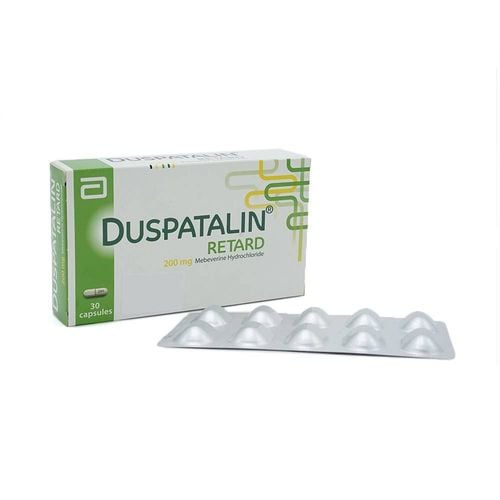Eldoper is an anti-diarrheal medication formulated as capsules. This drug is commonly prescribed for the treatment of acute and chronic diarrhea, loose stools, idiopathic diarrhea, and even diarrhea in individuals with AIDS.
1. What is an Eldoper? What are its effects?
- Drug Name: Eldoper
- Dosage Form: Capsules
- Category: Gastrointestinal medications
1.1. Composition of Eldoper:
- Eldoper contains Loperamide hydrochloride with a dosage of 2mg per capsule as its main ingredient. This compound works by stimulating gastrointestinal contractions and increasing anal sphincter muscle tone. Loperamide is rapidly absorbed in the intestines and is primarily excreted through stool and urine.
- Eldoper is available in the form of hard capsules, packaged in boxes containing 10 blister packs, with each blister containing 10 capsules.
1.2. Pharmacodynamics of Eldoper:
Loperamide is an active compound that binds to opioid receptors in the intestinal wall, reducing mucosal irritation and stimulating gastrointestinal contractions. Eldoper slows intestinal peristalsis, prolongs intestinal transit time. Loperamide increases anal sphincter muscle tone, thereby reducing urgency in uncontrolled bowel movements.
Due to its high affinity for intestinal tissues and significant first-pass metabolism in the liver, Loperamide has minimal systemic circulation effects. It reduces intestinal motility through its direct peripheral action on the intestinal wall. Thus, Loperamide-based drugs can be effectively used to manage symptoms of acute and chronic diarrhea, prolong intestinal transit time, and enhance absorption in patients with an ileostomy.
1.3. Pharmacokinetics of Eldoper:
Loperamide is easily absorbed in the intestines (approximately 40%), but most of it undergoes metabolism in the liver into inactive forms and it is excreted through stool and urine, both as unchanged and metabolized forms. Drug concentrations in breast milk are relatively low. Loperamide has a 97% protein-binding rate in plasma. Its half-life in humans ranges from 9 to 14 hours, and it is primarily eliminated through feces.
1.4. Effects of Eldoper:
Loperamide is a medication used to treat acute diarrhea of unknown causes and certain chronic diarrhea conditions. It is a synthetic opioid that, at therapeutic doses, has minimal effects on the central nervous system. Loperamide reduces intestinal motility, decreases gastrointestinal secretion, and increases anal sphincter tone. Additionally, Eldoper prolongs intestinal transit time, enhances the absorption of fluids and electrolytes, and reduces stool output. These effects are associated with decreased release of acetylcholine and prostaglandins in the gastrointestinal tract.
2. What does Eldoper treat?
Eldoper is used to treat the following conditions:
- Reduces symptoms of acute nonspecific diarrhea and chronic diarrhea caused by inflammatory bowel diseases.
- Decreases stool volume in individuals who have undergone an ileostomy procedure.
- Treats symptoms of acute diarrhea in adults and children aged 12 years and older.
- Manages symptoms of acute diarrhea associated with irritable bowel syndrome (IBS) in adults aged 18 years and older, following a preliminary diagnosis by a doctor.
3. How to Use and Dosage of Eldoper
3.1. How to Use Eldoper
Eldoper is available in capsule form and is taken orally. Swallow the capsules with an adequate amount of cooled boiled water. It is important to follow the prescribed dosage and timing as recommended by your doctor.
3.2. Dosage of Eldoper
- For adults with acute diarrhea:The typical initial dose is 2 capsules per dose. After each subsequent episode of diarrhea, take 1 capsule. On average, adults take 3 to 4 capsules per day.
- For children aged 2 to 5 years (13–20 kg): The recommended daily dose is 3 mg, equivalent to 1.5 capsules.
- For children aged 6 to 8 years (20–30 kg): The daily dose is 4 mg, equivalent to 2 capsules.
- For children aged 8 to 12 years (over 30 kg):
The daily dose is 6 mg, equivalent to 3 capsules. - For patients with chronic diarrhea:
The starting dose is 2 to 4 capsules per day. The dosage can then be adjusted depending on individual needs until stools become firm. - Patients should strictly follow the prescribed dosage and avoid exceeding dosage so patients shouldn’t take over 8 capsules per day, whether treating acute or chronic diarrhea, to prevent potential adverse effects.
3.3. Handling Missed or Overdosed Doses
Missing or overdosing on Eldoper can lead to undesirable side effects. Missing a dose typically does not affect the patient’s overall health; however, it may reduce the effectiveness of the treatment. On the other hand, overdosing can easily cause adverse reactions. It is essential to understand how to handle such situations to minimize risks in any scenario.
Missed Dose:
- This is typically relevant for the treatment of chronic diarrhea.
- Take the missed dose as soon as you remember.
- If it’s close to the time for the next scheduled dose, skip the missed one and take the next dose as planned.
- Avoid doubling the dose to compensate for the missed one.
Overdose: Symptoms of overdose may include dizziness, abdominal pain, or constipation. Notify your doctor immediately for prompt medical assistance if an overdose occurs.
4. Adverse Effects of Eldoper
- When using Eldoper, you may experience some adverse effects related to the immune system, though these are rare, such as anaphylaxis or hypersensitivity reactions.
- Some effects related to the nervous system that may occur include headaches and dizziness.
- Adverse effects associated with the digestive system may include constipation, nausea, and bloating, which are commonly observed. Notably, it may cause intestinal obstruction in young children; therefore, caution is required when using the medication in this population.
- Other adverse effects on the digestive system that may occur include abdominal pain, vomiting, discomfort, or dry mouth; however, these are less frequently reported.
- Skin-related adverse effects when using Eldoper may include rash and itching, though these are uncommon. More severe reactions, such as toxic epidermal necrolysis or Stevens-Johnson syndrome, are rare.
- Adverse effects on the urinary system when using Eldoper include urinary retention, but this is rare.
If you experience any of the aforementioned adverse effects, especially constipation, it is essential to report them to your treating physician promptly for appropriate management.
5. Interactions of Eldoper
Concurrent use of Eldoper with certain drugs that inhibit P-glycoprotein, such as quinidine or ritonavir, may increase the concentration of Eldoper in the blood. This is because Eldoper is transported by P-glycoprotein; however, the clinical significance of this interaction is not yet known.
When Eldoper is used simultaneously with itraconazole, gemfibrozil, or both, it may result in increased concentrations of Eldoper in the blood.
Using Eldoper alongside drugs containing desmopressin may interact due to Eldoper's effect of reducing gut motility. This can lead to increased absorption of desmopressin and, consequently, higher blood levels of the drug.
6. Precautions When Using Eldoper
6.1. Contraindications for Eldoper:
- Eldoper should not be used in children under 12 years of age or elderly individuals.
- The medication is contraindicated in patients with acute ulcerative colitis or pseudomembranous colitis caused by broad-spectrum antibiotics.
- Patients with acute dysentery characterized by blood in stool and high fever should not use Eldoper.
- Eldoper is contraindicated in cases of acute ulcerative colitis.
- Patients with bacterial enteritis caused by invasive pathogens should avoid using the drug.
- Avoid vigorous activities that may inhibit intestinal motility.
- Discontinue Eldoper immediately if intestinal obstruction, constipation, or abdominal distension occurs.
- The drug should not be used in individuals who are hypersensitive to its components, including those with infectious diarrhea caused by invasive bacteria like E. coli, Salmonella, or Shigella, and those with severe liver impairment.
6.2. Special Considerations for Specific Groups:
- Pregnant Women:
Eldoper is classified under Pregnancy Category C. While there is no data indicating harmful effects on the fetus, it is not recommended for use during pregnancy. It should only be used when absolutely necessary, and the benefits outweigh the risks. - Breastfeeding Women:
Loperamide, the active ingredient in Eldoper, can be excreted into breast milk when taken by the mother. Caution is advised when using the medication in breastfeeding women. Eldoper is not recommended for this group and should only be used when absolutely necessary to ensure the child’s safety. Mothers using Eldoper should consider switching to formula feeding to avoid potential risks to the baby.
Eldoper is a medication used to treat diarrhea, formulated in capsule form. This drug is commonly indicated for the treatment of acute and chronic diarrhea, loose stools, and idiopathic diarrhea. To ensure effective treatment and avoid unwanted side effects, patients must follow the instructions provided by their doctor or pharmacist.
Follow the website of Vinmec International General Hospital to access more information on health, nutrition, and beauty to protect your health and that of your loved ones.
To schedule an appointment at the hospital, please call the HOTLINE or book directly HERE. Download and use the MyVinmec app to automatically schedule appointments, manage and track your bookings, and make appointments anytime, anywhere through the app.













